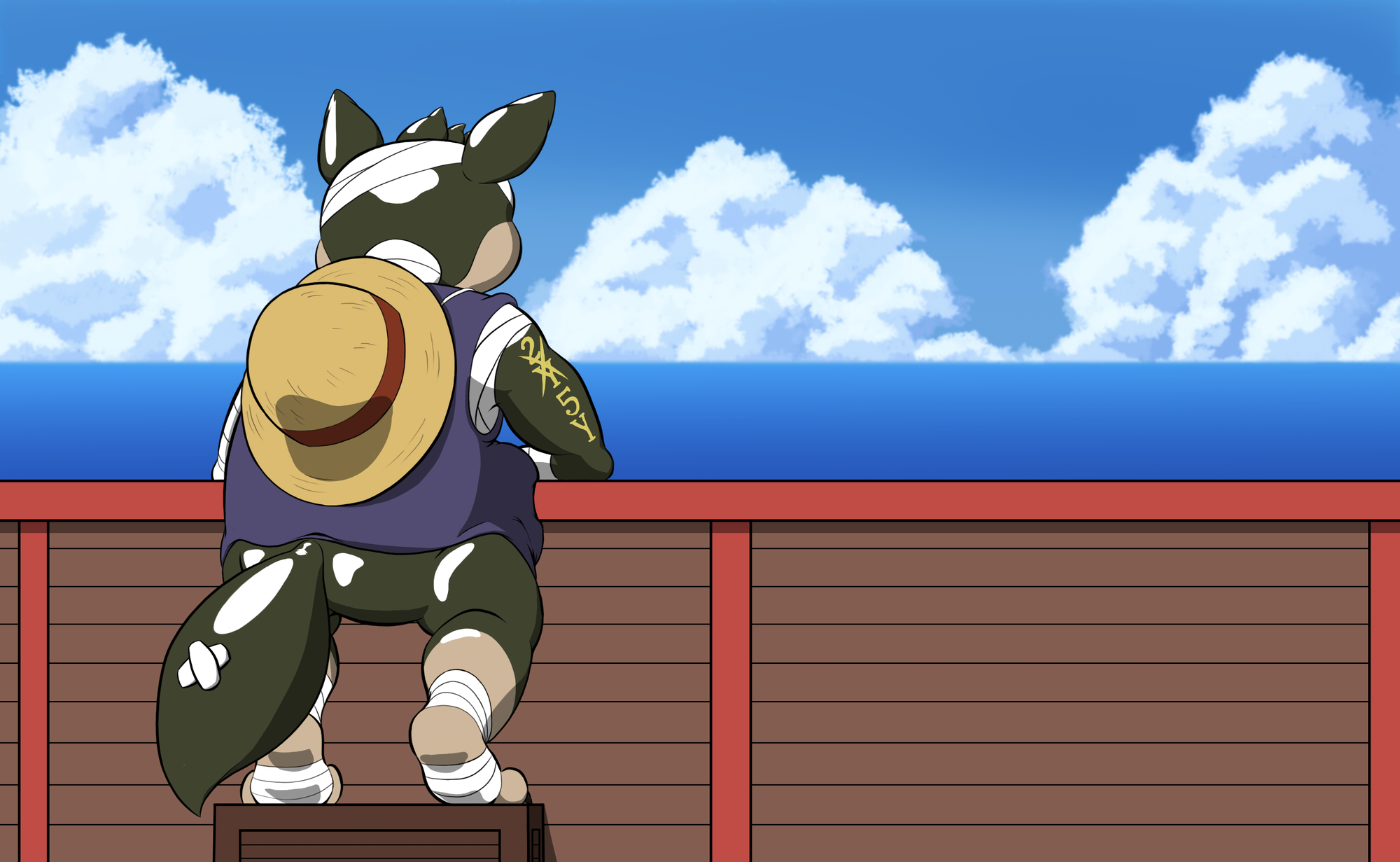Is the Furry Fandom Socialist?

I don't like politics.
That may sound incongruous with what I do on the Internet, but I sincerely don’t like politics. Ideally, I wouldn’t have to talk about it, because we wouldn’t have to be afraid of whatever the government is doing. It wouldn’t have the power to control people’s lives, and it would be a peripheral concern at best. But that’s not the way it is, and so I have to speak out about it. So when people try to politicize my hobbies and interests—which should be a respite from all the political bullshit—I get justifiably angry. Sometimes I get so angry that I write about how the person’s understanding of the hobby is completely bass ackwards. This is one of those essays.
A couple weeks ago, I found a short Twitter thread from a furry who uses the handle @LeftistFoxbutt (he goes by “Attica”). Make of this little rant what you will, but I’d like to touch on one point in particular: “This Fandom [the Furry Fandom], much to AltFurry’s dismay, is definitively socialist in its practice and organization.” For the purposes of this essay, it is unimportant what exactly AltFurry is. What is important is the last part of the tweet, which asserts that the Furry Fandom is “definitively socialist in its practice and organization”. This notion is simply false.
In fact, the Furry Fandom is really quite capitalistic in its practice and organization.
First, let’s try to understand what it would mean for the Furry Fandom to be “socialist in its practice and organization.” Now, whenever a capitalist such as myself attempts to define the socialist social order, he always gets criticized for straw manning (c.f, “that's not real socialism”). So in the interest of not misrepre-senting Attica’s position, I read the first installment of his pamphlet, The Cultural Barxist. It’s worth a read if only because capitalists, both furry and non-furry, will likely find much of it—such as advocating for supporting small businesses to fight capitalism—hilarious. Those who are more philosophy-savvy may also laugh and cringe at the sheer ignorance of its contributors (such as one who claimed that Nazis were moral absolutists, even thought they did not believe in absolutes). Additionally, it advocates theft and bribing people if you get caught committing theft, turning away from “industrial overproduction” and destroying capitalism as means to save the environment, and includes an excerpt from the incoherent trite that is Allen Ginsberg’s “Howl”. It just generally makes good mocking material.
However, Attica did contribute one essay about the Furry Fandom expressly,: the last essay, titled, “My Comrade in Fur”. It’s quite full of contradictions, paranoia, and Marxian gibberish. But if you can stomach it, you will be able to find the rationale (or rather, rationalization) behind his claim that the Furry Fandom is “definitively socialist in its practices and organization”. Take a look at this: “When something becomes popular it enriches the entirety of the Fandom rather than cheapens it because that creation is proliferated around the whole of the Fandom, not sold down to it with profits extracted out of it.” This implies that anything contributing to the fandom from within is adding value to it, and anything contributing to it from without is taking value away from it. In other words, if a company such as Hot Topic were to release a line of various animal ears that were lower-quality than the handmade ones made by furries, this would not add value to the fandom. To put it another way, offering a cheaper but perhaps lower-quality and less customizable alternative to commissioning a costume maker, which may offer poorer furries a way to participate in the costuming aspects of the fandom, is bad because it takes profits out of “The Fandom” and gives it to those evil, mundane corporations, thereby taking value away from the Fandom as a whole.
This explains why Attica believes that the Furry Fandom is “socialist in its practice and organization”. He views the Furry Fandom as a kind of class unto itself (or at least, the alleged “inner workings” of the Fandom mean that all furries are of the same class), and therefore he sees the internal economic dynamics of the Fandom not as individuals participating in a free market, but as a collective class supporting itself by keeping profits circulating within itself. When one furry commissions another furry for art, that is not a capitalistic transaction between two individuals, but rather one fuzzy comrade supporting another. The means of production for furry paraphernalia is owned by furries, not by mundanes, so when the latter tries to contribute value to the Furry Fandom, this is interpreted in Attica’s Marxist ideological framework as expropriating the means of production from the furry class, thereby “exploiting” the Furry Fandom. So it isn’t so much that the Furry Fandom is socialist, as much as it is that Attica has framed it as such. I’m sure most of my readership already understands the flaws in this way of framing the argument, or at least has a sense thereof, but let me criticize it briefly and explicitly.
The problem with this whole analysis is that it is collectivist. Fundamentally, there’s no kind of economic dynamic between “The Furry Fandom” as a whole and “the corporations” as a whole because neither of these abstractions literally exists. There are only economic dynamics between individual furries and individual corporations. There is no meaningful sense in which a corporation’s providing values to furries is “extracting profits from the Fandom”. (It may invite some people who are less “committed” to the fandom, but Furry in particular is suffic-iently weird that it’ll eventually drive out the uncommitted. Problems would only arise if and when the less serious ones demand that the rest of the fandom changes its behavior to suit their tastes.) In a similar vein, there is no meaningful sense in which the economic dynamics between one furry and another is driven by a kind of subconscious desire to promote the interests of the Furry Fandom qua Furry Fandom (since such a thing does not literally exist, and thus cannot have any “interests”: only the mind can be “interested”, and the mind is individual). It’s understandable, then, why most capitalists think the notion that the Furry Fandom is “socialist” is patently absurd. This kind of explicitly collectivist mindset is incredibly foreign to Westerners who have never studied Marx. Capitalists often take individualism for granted, so collectivist arguments can often go way over their heads because they are so far outside of their headspace.
Here’s the bottom line.
Fandoms don’t exist independently of the individuals that choose to contribute to it. Fandoms don’t make profits; the individuals who make and sell art within a Fandom do. The profits of an artist do not belong to the Fandom; they belong to the artist and the artist alone. Those profits are the product of his mind and his efforts and no other individual can lay any legitimate claim to the profits he has made. Since Fandoms can’t have or make profits, a corporation that profits by selling merchandise to the members of a fandom isn’t “exploiting” it or “extracting profits” from it. Attica has framed the argument on false, collectivist premises, and so his entire analysis is invalid and his conclusions are incoherent.
Now, let’s analyze the practices and organization of the Furry Fandom from an individualist perspective. In particular, we will analyze the artistic aspect of it.By far the most significant aspect of the Furry Fandom is its appreciation for art and artists. Furries spend loads of money on art: both PG and pornographic. Additionally, furries consume a lot of furry paraphernalia. There are websites dedicated to sharing and selling furry artwork and paraphernalia, such as Fur Affinity, Furry Network, and Furbid. And the artwork and paraphernalia can be extremely expensive: Not only are some artists very expensive to commission, but the article most commonly associated with the Furry Fandom, fursuits, can cost upwards of $1,500. The higher-quality ones can cost much more, meaning that depending on your budget, you may be deciding between buying a fursuit and buying a used car.
Anyone who isn’t blind, deaf, dumb, and utterly corrupted by Marxist sophistry can see that this is not only essentially capitalist but also quintessentially capitalist. It embodies the capitalist social order in every conceivable way. An objective observer will identify that the Furry Fandom is full of individuals who voluntarily exchange value (art) for value (money, or in a few cases, art in turn). Additionally, there is a general respect within the Fandom for artists, i.e., the producers. There is a tacit understanding that it’s wrong to demand or even expect that an artist make you art for free. Anyone who does demand or expect it is rightfully censured. You can’t get something for nothing; you must exchange value for value. What’s even more striking is that the artists are generally the price givers, not the price takers. Art is the product of the artist’s mind and effort, and so it is his property, which he may dispose of in whatever way he judges. One is not entitled to the product of the artist’s mind and effort; the artist conceives and creates the art, so he has the exclusive right to set the price for it. If the customer doesn’t like that, he can take his money elsewhere. Further, anyone can enter the market—there are no major barriers to entry—and everyone has a chance to become a popular artist if he is skilled and efficient enough. The market is so big that it’s no exaggeration to say you can find an artist who can make whatever your heart desires, to an almost arbitrary degree of specification. Fittingly enough, this is almost like an artist’s rendition of capitalism: precisely as it might and ought to be. The result? A colorful community where the producers get the money, respect, notoriety, and above all reverence that they deserve.
There is still envy—or hatred of the successful for being successful—within the Furry Fandom, obviously, because no one wants to take the premises listed above to their logical conclusion: that money is the product of virtue. There is a Twitter account called For Exposure, which is dedicated to documenting instances of entitled little pricks who want free art, and obviously, there are people like Attica, who are not afraid to tell a person who works at a company that produces animal dildos that they think her company should be collectivized and “owned” by the workers. But seeing as For Exposure is incredibly popular, and Attica’s neuroses fairly unpopular (see also here, here, and here), progress is clearly being made. At the very least, we don’t seem to be regressing.
But progress can always be made and that kind of envious behavior must be called out wherever it exists. So I call upon other furries and non-furry allies to continue to call out and mock the people who advocate this envious, altruistic mindset. If anyone, it is they who will destroy everything good about this fandom. A community whose members tolerate and promote its antithesis is bound for annihilation. This is not about discouraging people from having different politics; this is about discouraging people from the position that the Fandom should be restructured according to collectivist principles, which is literally what Attica is promoting. These people need to be told, earnestly and in no uncertain terms, to fuck off. They cannot be allowed to realize their vision for this fandom, because that vision is, despite their delusions, the complete destruction of Furrydom. Furries need to start putting their footpaws down and convincing these people either to abandon their endeavors to collectivize the Fandom or to abandon the Fandom altogether. And if they continue their antics, seemingly impervious to all reason, there’s no shame in just disassociating from such people. They have freedom of speech, but you also have freedom of association. You’re free not to listen; you’re free to walk away; you’re free to break off all relations with them. So if all else fails (and I stress that this is an absolute last resort), by all means, exercise your right to disassociate from these lunatics who want to destroy the Furry Fandom.
Do not sacrifice this fandom to those who are its worst. Do not tolerate these knuckleheads who want to destroy this fandom under the pretense of “saving” it. Do not think you can compromise with or appease these people; you cannot. There can be no compromise between life and death; you cannot appease your destroyer by allowing him to destroy you “just a little bit”. Fight these people, with the radiant certainty and the absolute rectitude of knowing that yours is the battle for any achievement, any value, any grandeur, any goodness, any joy that has ever existed in this fandom, and that theirs is a rebellion against all of these things.
“You will win when you are ready to pronounce the oath I have taken at the start of my battle—and for those who wish to know the day of my return, I shall now repeat it to the hearing of the world:
“I swear—by my life and my love of it—that I will never live for the sake of another [furry], nor ask another [furry] to live for mine.”





Discussion